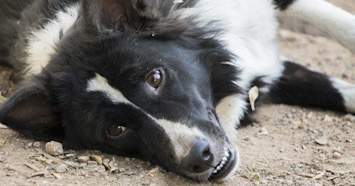
Dogs are known for their renowned sense of smell and top tier olfactory receptors – but that doesn’t mean they make good choices when it comes to following their nose. In fact, some dogs have downright disgusting taste in what they’re willing to sniff, taste, and coat their pelts in. What is this phenomenon? And why do dogs eat poop?
If your dog enjoys dining on feces, your first call should be to his veterinarian. Ask the vet to perform a thorough physical exam and discuss with him your dogs feeding routine including amount of food per day, brand, and any supplements you are offering. Your veterinarian may recommend a change to the dog’s diet, or he may prescribe a medication or supplement to curb your dogs stool eating behavior.
Once your vet has ruled out any potential medical problems, you can begin focusing on resolving training your dog not to eat feces. The easiest way to ensure your dog won’t eat feces is to pick up the area where he eliminates each time he has a bowel movement.
What is Coprophagia?
Coprophagia is the official term for a dog who consumes either its own feces or another animal’s feces. Coprophagia, or “stool eating”, is a common habit in dogs. Puppies are especially fond of this behavior as are dogs that live in extremely cramped quarters (as in puppy mill settings) or suffer from malnutrition.
But even healthy adult dogs do it. That’s because:
They’re evolutionary adapted to coprophagia as an integral part of raising their young (they eat their babies’ stool to keep them clean)
In the wild, eating poop helps keep their dens clean
To a dog, poop sometimes just tastes good
Cat poop, in particular, appears to be a delicacy to certain dogs. Carnivore feces contains more proteins and fats and are, therefore, more-highly prized; so much so that some will do anything to get into the cat box and steal a morsel.
How Do I Stop My Dog From Eating Stool?
If your dog enjoys dining on feces, your first call should be to his veterinarian. Ask the vet to perform a thorough physical exam and discuss with him your dogs feeding routine including amount of food per day, brand, and any supplements you are offering. Your veterinarian may recommend a change to the dog’s diet, or he may prescribe a medication or supplement to curb your dogs stool eating behavior.
Once your vet has ruled out any potential medical problems, you can begin focusing on resolving training your dog not to eat feces. The easiest way to ensure your dog won’t eat feces is to pick up the area where he eliminates each time he has a bowel movement.
Some owners have found success adding pineapple, pumpkin filling, or carrots to their dog’s diet, but this is not a guaranteed cure.
Teach Your Dog to “Leave It”
“Leave it” is one of the most valuable, and versatile safety skills we can teach our dogs. If your dog doesn’t know a “leave it” cue, train him to understand the word and begin to redirect him when he attempts to pick up stool. If your dog is young, we recommend teaching the “leave it” command with other basic training staples.
What To Do When Your Dog Eats Cat Poop
If your dog is eating cat’s feces, it will be necessary for you to move the cat litter box to an area inaccessible to the dog. This will also prevent an ambush on your cat which could lead to litter box aversion. Punishing your dog typically doesn’t decrease their stool eating behavior because we are unable to administer the punishment each time the dogs performs the behavior. Direct supervision, proper sanitation, adjusting your dog’s diet, and allowing him to mature are the best answers we have at this time.
Is it Dangerous For My Dog To Eat Poop?
Strangely enough, it’s not necessarily as unhealthy as you might think. After all, if the stool producer is healthy, free of parasites, and gets fed a commercial diet (like most household pets do), he’s unlikely to pass anything infectious along to the stool eater. In fact, the stool might even contain some healthy bacteria or needed nutrition we’re not aware of.
Nevertheless, dogs who eat even “clean” stool from house cats tend to ingest way more calories than they should, may inadvertently ingest any medications the cats may be taking, are at greater risk of gastrointestinal upset, and, most notably, are committing an egregious sin against all established principles of proper hygiene.
Then there’s the possibility of ingesting outdoor animals feces, which I absolutely do not encourage and is in no way considered a low-risk activity.
Why Does My Dog Roll in Poop?
Rolling in feces is a particularly common –– and revolting –– one. As it turns out, there is almost certainly a biological rationale for this. It’s been suggested by scent scientists and wildlife biologists that they engage in this behavior so they can mask their own canine scent. Here’s why:
The strong aroma of carcasses and decay creates a sensory explosion for animals who rely on their snouts for sustenance. Rolling in the stuff means they can throw predators off their trail and keep prey in the dark about their doings. All this so they can eat well, unencumbered by the competition other carnivores might offer.
Although this makes sense, it makes it no less revolting. If your dog is regularly coating themselves in gross scents, try to keep an eye on them in the yard and let them know your expectations without punishing them – it is their natural instincts, after all.